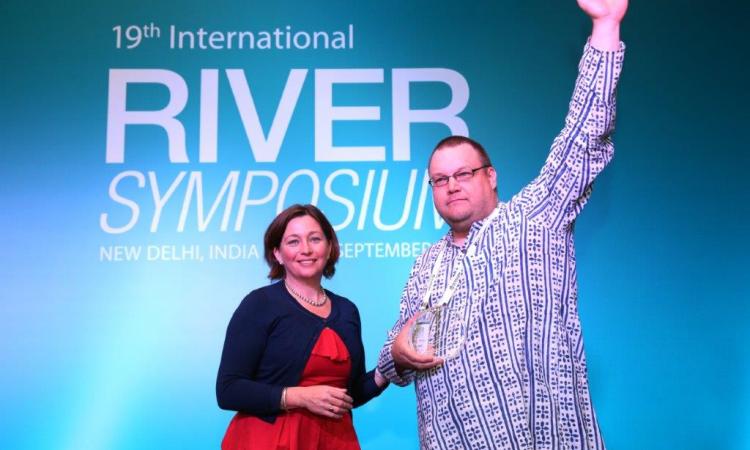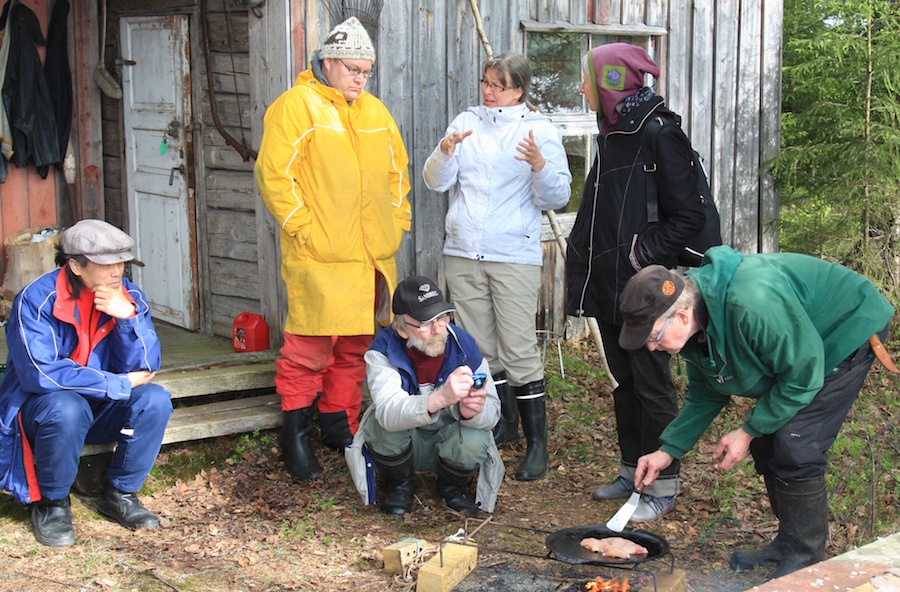
The Emerging River Professional Award is an initiative of the International RiverFoundation. The award recognises and fosters early career professionals who have demonstrated innovation, excellence and leadership in the areas of rivers, basins or river-dependent communities. The winner receives a cash prize of AU$5,000.
Three finalists were selected for the award: Lee Garnett from Australia for her work on the catchment urban water resource management in Queensland; Tero Mustonen for his work incorporating traditional knowledge to monitor and restore watersheds in North Karelia, Finland; and Jaime Ruprecht from Australia for his work on acid sulfate soil remediation in New South Wales. Finally, Tero Mustonen won accolades for his river restoration efforts by incorporating traditional knowledge.
Tero is from the Snowchange Cooperative in Finland. He is also a leader of Selkie, a small village of 300 people. Selkie has one of the most advanced ecological restoration project in Finland, monitoring rivers at the moment. Also, this project is quite effective in terms of engagement with fishermen, women, hunters and other villagers as well.
Here’s an excerpt of the interview with Tero Mustonen.
How did traditional knowledge help you in monitoring and restoring river basins?
There was an incident of fish death in 2010-11. It went unnoticed by the government and the corporation that was in charge of the catchment at that time, but it was detected by our fishermen. As long as we harvest fish, we will be able to monitor the river with their help and tackle these kind of crises. This signifies that nature in itself is a bioindicator.
So, utilising traditional knowledge for monitoring and restoring river basin has three elements.
- By allowing people along the river to do what they do--hunting, fisheries, berry picking or just being with the river. Our primary source of information comes from the monitoring and assessment done by them using their knowledge. Another, very crucial part is to recall histories--we don’t necessarily have the baseline scientific information of how things used to be in the early 20th or 21st centuries and therefore the information on the overall history and traditional knowledge of villages can be used to create that baseline. Often it’s quite reliable, if people are concerned and if it is village-led or controlled as opposed to the top-down approach.
- The traditional knowledge can inform and guide in those spaces and communities where scientific data are lacking or don’t exist from long time ago. Place names in the local languages are also one indicator that helps in detecting how things used to be in the past.
- The most important element of utilising traditional knowledge is to understand that there are seen and unseen relationships between the locals and their environment. This is because the locals or villagers develop a deep connection with their environment which gets passed from one generation to another like any heritage does.
 Have you come across any challenges from the government authorities while implementing traditional knowledge?
Have you come across any challenges from the government authorities while implementing traditional knowledge?
Despite the fact that on the surface we are very modern and a young country (only 100 years old), the government is resistant to changes in policies and does not easily accept the traditional wisdom. This is of course, the case in the global context as well, therefore you need to demonstrate in practice how traditional knowledge is a viable mechanism. At first, we spent a few years at Snowchange Cooperative doing this.
Things are changing slowly, but it’s still a struggle because right now, Finland’s economy is driven by timber and wine making, so extraction of natural resources in the peripheries is quite prevalent; a reason why we have to say no to some of these land uses, including hydropower, if we need to survive climate change and impacts from the past damages.
Why is documentation of traditional knowledge necessary?
Passing of knowledge, practices, beliefs and ideas about nature and culture is an unbroken link, so we, at Snowchange, try to put all of our little assets to those villages where traditional knowledge can still renew itself. Sometimes it becomes necessary to document it on maps, in interviews, books or online because it has an inherit value for humanity and the documentation makes facts visible. For example, if a mining company wants to come into a village for which the land use has been mapped, then you can take it to the company to demonstrate and tell them that “don’t come here, this is our place”.
Traditional knowledge is a tool. We should not, however, get trapped by this idea. Many people, especially at universities and in academia, have a great interest in traditional knowledge and they think that by documenting it, they own it, which takes away from its usability as a tool. Therefore, the only way traditional knowledge will survive is by passing it on and not holding it to oneself.
India is also a hub of traditional knowledge. But sometimes development comes in the way of its implementation. Your thoughts?
India, namaste! The only answer to this question is to start looking at the traditional resources of each village. Along with this, you can also try to look at some legal mechanism that support forest activities and traditional knowledge after carrying out the public consultations and social-impact assessments. However, these might be providing some weak tools but ultimately how effective they are depend on whether the local people resist or implement the traditions. Therefore, it becomes a question of leadership that if the head of the village wants to hold onto the traditional beliefs or not.
I don’t have an easy answer to this but I think we might lose some areas to industries and climate change and there may not be a big victory. However, there will be hundreds of small victories and those communities that have that consistency and the capacity to maintain their well-being and culture will face immense pressure--from academia and media--as it’s quite fashionable to talk about traditions. For example, if you publicly say that there is an old grandfather who still imparts wisdom, then there will be millions of “flies” that get attracted to you or say, the old grandfather. Also, the damages and threats not only come from physical destruction of habitats, but from the avalanche of technology like smartphones, tablets, etc and dependency on media also plays a role in these damages. Along with these threats, there is one major hurdle to the implementation of traditional knowledge and that is the lack of unity among the local people.
Like I said before, I don’t think there is one answer. I think that each of us have to face the changes and decide whether we will let cultures take a rebirth and slow the pace of damages or let the instincts get lost, which is incredibly sad. The success of implementation of traditional knowledge also depends on the leadership and I am a strong advocate of the fact that more women should take these leadership positions to make things better since a lot of these damages have been done by men.
'India should take a strong stand against hydropower; it may bring quick benefits but the long-term damages are huge.'
Regressive works are on to restore Indian rivers like the Ganga and the Yamuna. Your thoughts?
I feel that community-based documentation of traditional practices and knowledge, along with the spiritual aspects, should be taken into account while documenting the restoration policies for these world-famous rivers. I am also advising that India should take a strong stand against hydropower; it may bring quick benefits but the long-term damages are huge. Coming up of dams mean loss of culture and languages, displacement of people and destruction of villages. Don’t do that; we did it in Europe 100 years ago. Even, many presentations at the symposium suggest the removal of hydropower dams. So, from our experiences from the hydroelectric stations, we are here to tell you that it’s the worst you can do to rivers.
Also, for effective river restoration, involve the local community along the river; they are not just the stakeholders but its owners in the customary sense as they consider the river their mother!
How do you feel about winning the award? What do you plan to do with the award?
I feel proud and happy for the hundreds of ladies and fishermen in the villages who got their traditional knowledge recognised. I am just a messenger of these people who could not come here and say thank you!
I will be sharing this award with the stakeholders, and of course will utilise it in the media and in directing the finances in further restoration efforts.